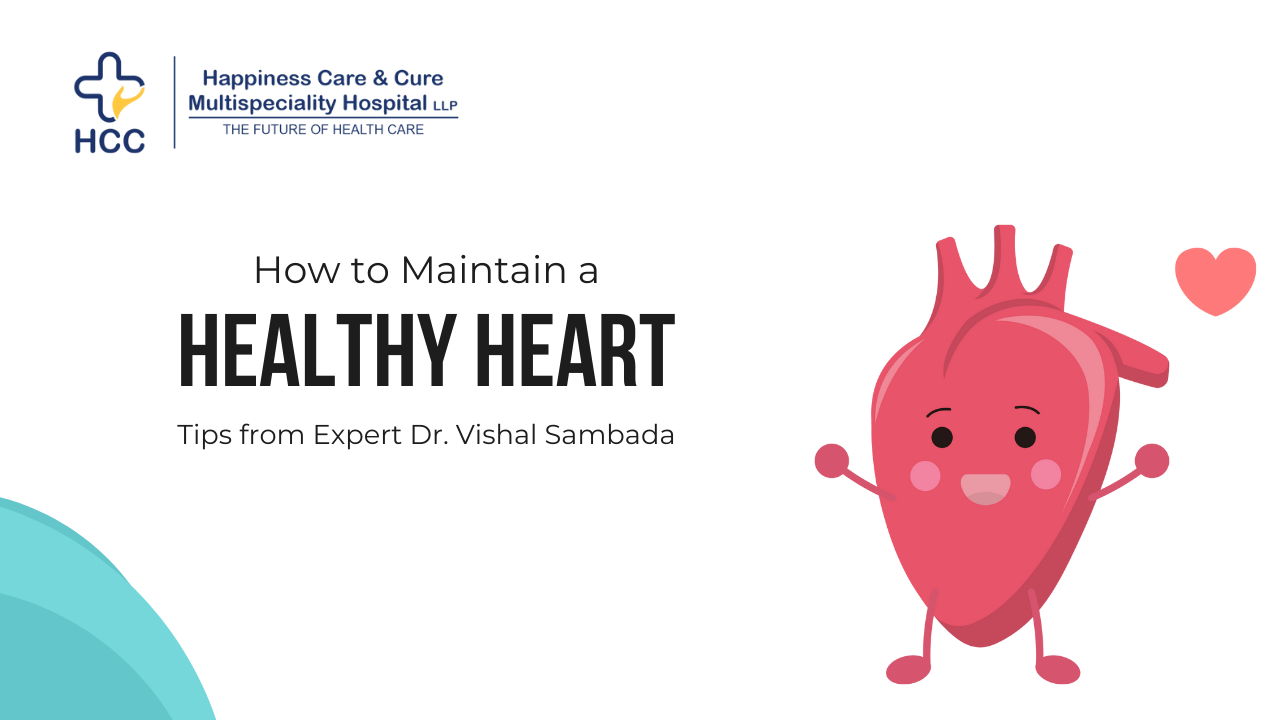
Introduction
In today's fast-paced world, maintaining a healthy heart is of paramount importance. Your heart is a vital organ, and taking good care of it can lead to a longer, happier life. To help you on your journey to heart health, we've gathered expert advice from Dr. Vishal Sambada, a renowned physician at HCC Multispeciality Hospital. In this article, we'll explore valuable insights and practical tips to ensure your heart stays in top-notch condition.
Understanding the Basics
1. The Importance of Heart Health
Before delving into the tips, it's crucial to understand why heart health matters. Your heart pumps blood throughout your body, delivering essential nutrients and oxygen. Keeping it healthy ensures that your body functions optimally.
2. Common Heart Conditions
Learn about common heart conditions, such as hypertension, heart disease, and arrhythmias. Understanding these conditions can help you take preventive measures.
Tips for a Healthy Heart
3. Maintain a Balanced Diet
Dr. Sambada emphasizes the significance of a well-balanced diet. Consume plenty of fruits, vegetables, lean proteins, and whole grains. Limit your intake of saturated and trans fats, as they can contribute to heart disease.
4. Stay Physically Active
Regular exercise is essential for cardiovascular health. Aim for at least 150 minutes of moderate-intensity exercise per week. Activities like brisk walking, cycling, and swimming can make a significant difference.
5. Manage Stress
Chronic stress can take a toll on your heart. Practice relaxation techniques like deep breathing, meditation, or yoga to keep stress levels in check.
6. Get Adequate Sleep
Quality sleep is crucial for heart health. Aim for 7-9 hours of restful sleep each night to allow your heart to recharge.
7. Quit Smoking
Smoking is a major risk factor for heart disease. Seek support and resources to quit smoking for good.
8. Limit Alcohol Intake
While moderate alcohol consumption may have some heart benefits, excessive drinking can harm your heart. Limit alcohol to a moderate level, if at all.
Regular Checkups and Preventive Measures
9. Routine Health Checkups
Visit your healthcare provider regularly for checkups. Monitoring your blood pressure, cholesterol levels, and overall health can catch potential issues early.
10. Medication Adherence
If you're prescribed medication for heart-related conditions, it's vital to take them as directed by your doctor. Skipping doses can lead to complications.
Expert Insights from Dr. Vishal Sambada
11. The Role of Genetics
Dr. Sambada explains that genetics can play a role in heart health. If you have a family history of heart disease, discuss it with your healthcare provider for personalized guidance.
12. The Importance of Regular Exercise
Exercise is not only for weight management but also for overall heart health. Dr. Sambada recommends finding an activity you enjoy to stay motivated.
Conclusion
Incorporating these tips and insights from expert Dr. Vishal Sambada into your lifestyle can significantly improve your heart health. Remember that maintaining a healthy heart is an ongoing process, and small changes can lead to significant benefits. Prioritize your heart, and you'll enjoy a longer and happier life.
Frequently Asked Questions (FAQs)
1. Can genetics alone determine heart health?
No, genetics is just one factor. Lifestyle choices, such as diet and exercise, also play a crucial role.
2. How often should I have my cholesterol checked?
It's recommended to check your cholesterol levels at least once every five years, starting at age 20.
3. What's the best way to reduce stress for heart health?
Practicing relaxation techniques like meditation and yoga, along with regular exercise, can help reduce stress.
4. Are all fats bad for the heart?
No, not all fats are bad. Healthy fats like those found in avocados and nuts can actually benefit heart health.
5. Can I reverse heart disease through lifestyle changes?
In some cases, lifestyle changes can help manage heart disease, but it's essential to consult your healthcare provider for a personalized plan.
Make an Appoinment